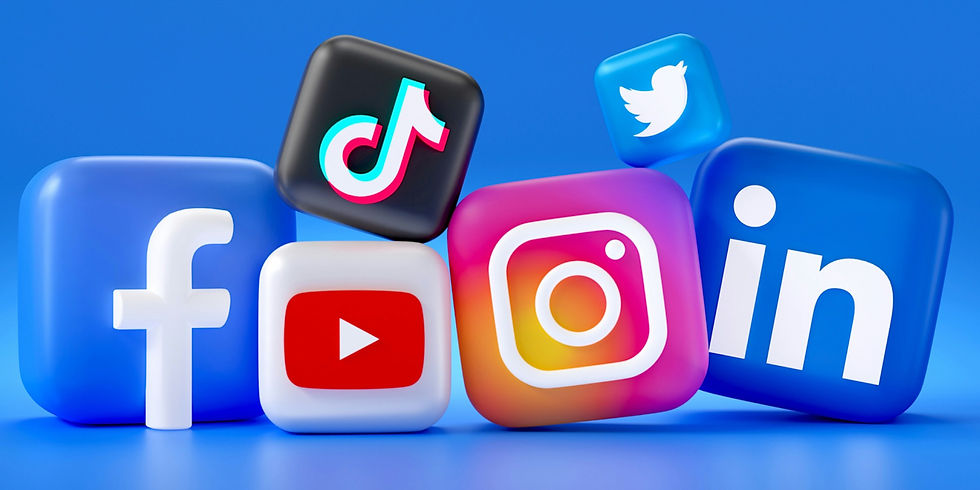The Social Media Trap: 7 Ways Social Media Impacts Mental Health
- Tom Bender

- Jul 16, 2025
- 3 min read
Updated: Aug 29, 2025

Do you ever feel like social media has a hold on you? Well, it might be impacting your mental health more than you think.
Seven ways that social media can have a negative impact on your well-being:
The Addiction Factor: Are you finding it difficult to control your social media usage and feeling like you can’t go a day without scrolling through your feeds? If so, you may be experiencing the addiction factor of social media. Research has shown that social media can lead to psychological dependency, similar to substance abuse. Psychological dependency on social media occurs when individuals feel the need to constantly check their feeds, posts, updates, and seek validation from others. This dependency can lead to negative consequences, such as reduced productivity, decreased self-esteem, and even symptoms of anxiety and depression.
Comparisons: Constant comparisons can lead to feelings of inadequacy. Seeing others achievements and milestones can make you feel like you’re falling behind in life. The impact of social media on body image is another aspect that can’t be ignored. Social media is filled with images of flawless bodies and perfect faces, leading to body image issues and feelings of inadequacy, which often promote unrealistic beauty standards which can fuel insecurities. Social media platforms often promote a narrow definition of beauty, emphasizing thinness and specific body types, which can perpetuate body dissatisfaction and fuel the desire for unattainable perfection. This can create a harmful cycle of comparing yourself to others and feeling pressure to conform to social trends.
This pressure to achieve these unrealistic standards can overshadow body positivity and acceptance.
Virtual Validation: Virtual relationships on social media platforms can heavily impact our self-worth and identity. When we constantly compare ourselves to the seemingly perfect lives of others, it’s easy to feel inadequate and develop a negative perception of ourselves. Social media creates an environment where we seek validation from others through likes, comments, and followers, which can become a measure of our self-worth. This constant pursuit of virtual validation can lead to a cycle of low self-esteem, as we constantly compare ourselves to others and feel the need to portray a perfect image online. It’s important to remember that social media is a curated version of reality and does not accurately reflect the complexities of real life.
Cyberbullying and Online Harassment: Cyberbullying refers to the act of using technology, such as social media platforms, to harass, intimidate, or harm others. Online harassment, on the other hand, involves various forms of malicious behavior, including cyberbullying, stalking, and hate speech. Research has shown that cyberbullying and online harassment can lead to increased rates of depression, anxiety, and low self-esteem among victims. The constant exposure to negative comments and abusive behavior can create a toxic digital environment that affects individuals mental well-being. It’s essential for users to prioritize cyberbullying prevention and online safety measures to promote a healthier online space.
Sleep Disturbances or Disruptions:
Social media can disrupt your sleep and cause disturbances in your sleep patterns. Research has shown that increased cognitive arousal from social media feeds can stimulate your brain and keep it active, making it difficult to wind down and relax before bed. Using Social media in general before bedtime can lead to difficulties falling asleep, staying asleep, and achieving restorative sleep.
Social Isolation and Loneliness:
While social media platforms are designed to connect people, research suggests that the use of social media can have the opposite effect which leads to feelings of isolation and loneliness. Studies have also found that spending too much time on social media can reduce face-to-face social interactions, which are crucial for building meaningful relationships and fostering a sense of belonging. Instead of engaging in real-life social activities, individuals may become engrossed in their virtual interactions, leading to a decrease in social connection and an increase in feelings of loneliness. Additionally, the addictive nature of social media can result in individuals spending excessive amounts of time on their social media platforms.
Unrealistic Expectations, Comparison and Anxiety:
Social media often leads to unrealistic expectations and anxiety. When you constantly compare yourself to others on social media, it can breed discontent and make you feel inadequate. Social media platforms provide an idealized version of people’s lives, often showcasing only the highlights and achievements. This curated content can create a distorted perception of reality, making it easy to believe that everyone else is happier, more successful, and living a more fulfilling life than you. The constant exposure to these seemingly perfect lives can erode your self-worth, breed feelings of discontent, and can be detrimental to your mental health.
In conclusion, addiction treatment for social media dependency has become increasingly important as more and more people struggle to limit their usage. Recognizing the signs of addiction and seeking appropriate treatment is crucial in order to regain control over one’s life and social media usage.
*Source Material: GerosHealth



